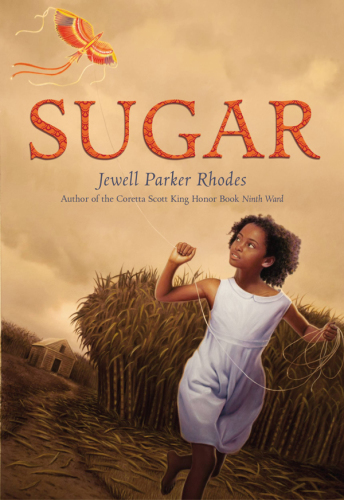
Sugar
فرمت کتاب
ebook
تاریخ انتشار
2013
Lexile Score
430
Reading Level
0-2
ATOS
2.9
Interest Level
4-8(MG)
نویسنده
Jewell Parker Rhodesشابک
9780316125789
کتاب های مرتبط
- اطلاعات
- نقد و بررسی
- دیدگاه کاربران
نقد و بررسی

gymnast19 - A lovely tale with a 10 year old slave girl,Sugar, whose mama died and father got sold.She lives with an old couple. She loved the old mans stories about bre'er rabbit.She lives on a sugar plantation in Mississippi and hates sugar even though her mom named her that and she harvest it everyday.Slavery is over and the master wants more help so he gets china-men. Sugar tries to prove that they have some good in while facing hard times.This book tells how it was like being a slave. This book is amazing.That is why I give it 5 stars

March 25, 2013
In 1870 Louisiana, five years after the Thirteenth Amendment outlawed slavery, Sugar is still bound to the crop whose name she shares: “I’m ten now. I’m not a slave anymore. I’m free. Except from sugar.” Sugar and her mother had been waiting for the return of her father, who was sold shortly after Sugar was born; when Sugar’s mother died, her daughter was left with nowhere to go. Sugar’s caring guardians and her occasional adventures in the woods are bright spots in her life, but she feels left behind as friends head north. When “Chinamen” are hired to work on the plantation, Sugar’s community feels threatened; however, Sugar’s intuition, curiosity, and spirit move her to befriend the perceived enemy and bring everyone together. Rhodes (Ninth Ward) paints a realistic portrait of the hard realities of Sugar’s life, while also incorporating Br’er Rabbit stories and Chinese folktales. Sugar’s clipped narration is personable and engaging, strongly evoking the novel’s historical setting and myriad racial tensions, making them accessible and meaningful to beginning readers. Ages 8–12. Agent: Michael Bourret, Dystel & Goderich Literary Management.

Starred review from March 15, 2013
Rhodes' book elegantly chronicles the hope of one 10-year-old girl seeking a bigger world in post-Civil War America. When Chinese laborers arrive, Sugar finally believes in a world beyond River Road Plantation. In 1870, five years after the Emancipation Proclamation, many former slaves remain on their plantations--only now working for a bleak slave wage. Sugar was born into slavery on a sugar plantation and still lives there, feeling constricted and anything but free. To the complicated relationship she enjoys with the plantation owner's son, Billy, is added another, with newly arrived "Chinamen" Bo/Beau and Master Liu. Most Americans are aware of the brutality of slavery, but few stop to consider that the abolition of slavery created a new turmoil for former slaves. How would they make a living? Rhodes exposes the reality of post-Civil War economics, when freed slaves vacated plantations, leaving former slave masters with a need for labor. In doing so, she illuminates a little-known aspect of the Reconstruction Era, when Chinese immigrants were encouraged to come to America and work alongside ex-slaves. Her prose shines, reading with a spare lyricism that flows naturally. All Sugar's hurt, longing, pain and triumph shine through. A magical story of hope from Coretta Scott King Honor winner Rhodes. (Historical fiction. 8-12)
COPYRIGHT(2013) Kirkus Reviews, ALL RIGHTS RESERVED.

June 1, 2013
Gr 5-8-Through the sharp eyes of a 10-year-old, readers experience the hardship of life on a Louisiana sugar plantation after Emancipation. Clever, courageous, and perceptive, Sugar is basically an orphan. Her mother died, and her father was sold five years before the story begins. She lives alone next door to Mister and Missus Beale, who have become her surrogate parents. Sugar wonders why she still can't do what she wants and why she still must work and live under miserable conditions. When she becomes friendly with Billy Wills, the son of the plantation owner, she can't understand why their friendship must be secret. Her feistiness and sense of loyalty shine in the poignant scenes when she insists on being with Billy when he is sick. When Mr. Wills hires Chinese workers to fill the void left by former slaves going north, Sugar is fascinated by their ways and their stories. She loves the Br'er Rabbit trickster tales Mister Beale tells in which Rabbit outsmarts the seemingly more clever hyena. As in Ninth Ward (Little, Brown, 2010), Rhodes has created a remarkable protagonist as she artfully brings American history to life. She shines a light on bigotry and the difficulty former slave owners and former slaves had adjusting to "freedom," and her skillful prose creates vibrant images of the story's milieu. Above all, though, this beautiful novel instantly grips readers' attention and emotions, holding them until the last word.-Renee Steinberg, formerly at Fieldstone Middle School, Montvale, NJ
Copyright 2013 School Library Journal, LLC Used with permission.

May 15, 2013
Grades 3-5 Ten-year-old Sugar, named after the cane she sharecrops with other freed people, hates her name. It makes her think of her father being sold off into slavery, her mother who died from the hard work in the fields, and her own life of toil. She would rather be playing, but she is the last little one around after all the other young people left the plantation to live in the North. However, her own way of life is threatened once she learns through her verboten friendship with the plantation owner's son that his father plans to bring in labor from China. Rhodes creates a unique cultural snapshot of Reconstruction Era Louisiana by introducing Chinese immigrants to the mix. Drawing inspiration from Lucy M. Cohen's Chinese in the PostCivil War South (1984), Rhodes creates a cross-cultural exchange that includes trickster tales, food appreciation, and good old-fashioned friendship. Sugar is an appealing, adventurous heroine full of curiosity and joy, an element sorely needed in light of the heavy subject.(Reprinted with permission of Booklist, copyright 2013, American Library Association.)

























دیدگاه کاربران